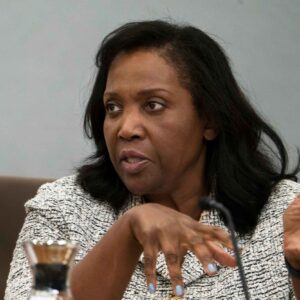In the debut episode of Her Take, Jillian Michaels, Ana Kasparian, Lindy Li, and Amy Dangerfield debate immigration, free speech, trans policy, and woke politics. Sparks fly as personal stories and political truths collide in this unfiltered, high-stakes female-led roundtable.
The debut episode of Her Take kicks off with a deep dive into the contentious subject of U.S. immigration policy, catalyzed by the real-life story of a gay Venezuelan asylum seeker who was deported. The hosts grapple with conflicting perspectives on the responsibility of the United States in granting asylum, the broader implications of immigration reform, and how political tribalism continues to shape public opinion.
Episode Recap
The Case at the Center: Gay Asylum Seeker Deported
The discussion opens with the story of Eduardo Flores, a gay Venezuelan man who fled his country fearing persecution and potential death at the hands of violent gangs. Though he entered the U.S. legally and had a compelling asylum claim, he was deported — reportedly ending up in an El Salvadoran prison. The panel critiques the current administration’s handling of such asylum cases, pointing out how judicial slowdowns and policy reversals leave vulnerable individuals at risk.
The debate becomes more nuanced as the conversation shifts to whether the U.S. should bear the burden of accepting asylum seekers when domestic stability is itself in question.
Crime, Deportation, and Political Framing
The panelists bring up contrasting examples of undocumented immigrants committing violent crimes, questioning how such incidents are politicized. They note that both citizens and non-citizens can commit crimes, but media and political narratives often selectively amplify these stories to advance partisan agendas.
A particularly jarring example discussed involves an undocumented man who violently assaulted someone, which reignites the debate over law enforcement priorities and moral responsibility in the immigration system.
Asylum, Policy, and Perception
One host reveals their ideological shift from left-leaning views to supporting tougher immigration stances, citing disillusionment with inconsistent Democratic positions. A recurring question is whether the U.S. should be the world’s refuge when it struggles with its own challenges. The hosts critique the Biden administration’s response to border policy and note the broader consequences of political optics outweighing pragmatic governance.
Culture Wars: From School Libraries to Gender Identity
The discussion transitions from borders to books. The hosts dissect a recent school district’s policy limiting the inclusion of LGBTQ+ books in elementary classrooms. While some defend parental rights to opt children out, others argue it promotes exclusion and censorship under the guise of protection.
The conversation intensifies around gender identity in schools, particularly around the California “Safety Act,” which allows children to socially transition without parental notification. The panel remains sharply divided — some see it as safeguarding vulnerable kids, others view it as a government overreach into family rights.
The LGBTQ+ Spectrum and Societal Division
A notable moment occurs when the panel critiques how the “T” in LGBTQ has overshadowed the rest of the community. There’s frustration over increasingly complex and evolving labels, and concern that identity politics create more division than unity. This includes a deeper critique of how trans issues have influenced policy, particularly in women’s sports and healthcare.
Wokeism, Religion, and Free Speech
The episode doesn’t shy away from religion or the “woke” left and right. The hosts argue over whether “Christ is King” slogans are inherently anti-Semitic, sparking a broader critique of modern religiosity and political correctness. They voice concerns about the erosion of religious freedom and the slippery slope toward labeling traditional beliefs as extremism.
Politics, Identity, and the Future
As the episode winds down, the discussion turns toward media censorship, political gatekeeping (such as Douglas Murray’s supposed attempts to influence podcast bookings), and the future of ideological diversity. The hosts express a desire for more honest dialogue — even if it’s messy — and lament the disappearance of a shared national identity in favor of fragmented political camps.
A Raw, Complex, and Candid Conversation
Her Take’s first episode sets a bold tone — unafraid to tackle polarizing topics with nuance, personal experience, and occasional disagreement. From immigration law to gender debates to cultural polarization, the show offers a platform for challenging mainstream narratives with thought-provoking, often uncomfortable, honesty.
Highlights & Standout Moment
1. “Christ is King” – Jordan Peterson’s Wild Theory on the “Woke Right”
Jillian Michaels and the Her Take panel breaks down Jordan Peterson’s viral appearance on Rogan, his theory on “political psychopaths,” and the feud over controversial guests like Daryl Cooper and Dave Smith. What is the “woke right”? Is free speech under threat from all sides?
2. “Needs to be Protected” – Jillian Michaels Defends First Amendment —EVEN for Hamas Supporters
The Her Take panel dives into the chaos around free speech, legal immigration, and the firestorm over Mamdouh Khalil. From pro-Hamas protests to First Amendment rights and accusations of antisemitism, this unfiltered debate pulls no punches.
3. “Indoctrinated Without Consent” – Parents Fight Back Over LGBTQ+ Books in California Schools
Jillian Michaels and the panel debate the Supreme Court case Makmood v. Taylor, where religious parents fight for the right to opt out of LGBTQ+ themed curriculum. Are schools overstepping? Are parents being silenced? A fiery culture war conversation you won’t want to miss.
4. “Parasites on the System” – Ana Kasparian and Jillian Michaels FIERY clash on Immigration Judge
The panel unloads on the ICE-evading judge, legal vs. illegal immigration, and the fury around voter ID and asylum abuse. With sharp takes on Trump, Biden, and the system’s failures, this debate digs deep into America’s immigration chaos and whether Democrats are gaming the system.


















Add comment